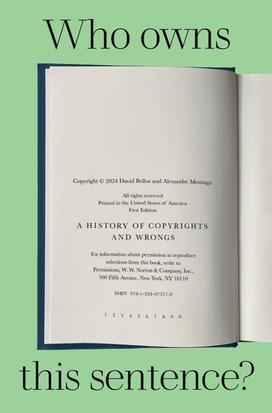Alexandre Montagu ’87 and professor David Bellos Explore the Complicated World of Copyright in New Book

The book: The history of copyright law is a long one. Authors Alexandre Montagu ’87 and David Bellos, professor of French, Italian, and comparative literature, explore copyright law from its origins in 18th century London, which was established to limit printers’ control of books. Who Owns This Sentence (W. W. Norton & Company) uses cultural, legal, and global history to explore the copyright and the impact it’s having on both controlling and monetizing so much of what we do. From photography to artificial intelligence, the book highlights the large variety of items, including intangible ones, that can now be copyrighted as laws have gotten stronger over the years. The duo ultimately makes a persuasive case for seeing copyright as an engine of inequality in the 21st century.

The authors: David Bellos is the Meredith Howland Pyne Professor of French and Comparative Literature at Princeton. He’s also the director of the Program in Translation and Intercultural Communication. His expertise includes 19th century French fiction translation, experimental and formal writing, and copyright issues.
Alexandre Montague earned his first degree from Princeton in 1987 in comparative literature, and went on to study at the University of Cambridge and Harvard Law School. He is a practicing lawyer and founder partner of MontaguLaw. His firm focuses on intellectual property law, international commercial transactions, and new media commercial and corporate law.
Excerpt:
On December 16, 2021, Sony Music Group announced that it had acquired the rights to the work of 72-year-old singer-songwriter Bruce Springsteen; the New York Times reported that the sale price was around $550,000,000.
Mozart was not so lucky! Nor Ray Charles, for that matter. The reason why a catalogue of songs and recordings can now be sold for the price of a fleet of small aircraft is the whole subject of this book: copyright.
What copyright means to the purchasers of Springsteen’s lifework is an entitlement to a license fee for all uses of the singer’s work (as sheet music, in translation, through broadcasts of old recordings and the streaming of new ones, and so on) until the end of the 21st century. As Sony has surely laid out less than it expects to get back, the tax it aims to extract from the global audience of Springsteen-lovers over the next century must run into billions.
What copyrights means to you and me, on the other hand, is that the bulk of modern and contemporary culture — not just Springsteen or The Beatles, but all the films, cartoons, novels, plays, paintings, ballets, video games, computer software, telephone directories, and banana costumes made by creators of all nations who are alive today — will not be free of licensing charges or of severe constraints on how they may be used until after your grandchildren reach retirement age.
The laws that create the opportunity to sequester and exploit creations of every kind for three of four generations do not have very deep roots and only in the last few decades have they acquired such scope, length, and power as to allow the accumulation of huge piles of money. That is why copyright now means more than it ever did before, and why we need to understand how it suddenly got to play such a large role in modern life.
This book explains where the idea was first sown, how it sprouted, developed, and ramified over centuries, and then, in a short space of time, was transformed into the biggest money machine the world has seen.
Yet nobody noticed. In earlier times, changes to copyright were made amidst loud and eloquent public debates in which the great minds of the age took part. In England, where the whole story began in the 17th century, John Locke, Daniel Defoe, and Alexander Pope, and later on William Wordsworth, Charles Dickens, and Thomas Macaulay, were all involved in the making of copyright. In 18th century France, the playwright Beaumarchais, the mathematician Condorcet, and Denis Diderot, who directed the first comprehensive encyclopedia, took up clear and public positions; many of the great writers of the 19th century, notably Honoré de Balzac and Victor Hugo, left strong marks on the development of copyright law. But in the last 50 years, copyright has spread over the globe without noticeable intervention from philosophers or poets, and with almost no public debate. Who among the creators of today — and who among the consumers of their works — has heard of the Geneva Convention for the Protection of Producers of Phonograms against Unauthorized Duplication of their Phonograms? Of the United States Code § 107, or T.R.I.P.S., or the Digital Millennium Copyright Act, or the C.T.E.A? Yet these legislative actions, which in their combination now create the value of the Springsteed catalogue, took place in 1971, 1976, 1994, 1996, and 1998 respectively — some time after the singer from Asbury Park first picked up a guitar.
These United States laws and their global extension through international treaties brought fundamental changes to individuals’ rights, to the privileges of corporations and to the status, effective remuneration, and creative freedoms of artists in all fields. Why have we heard barely a squeak from any philosophers, poets, musicians, or creators in the vast range of disciplines to which these new regulations apply? The framework in which almost all forms of creation and invention are now organized and monetized world-wide has been dealt with as if it were just a technical issue, outside of political and social debate. But it is not too late to ask whether the resulting situation serves the legitimate interests of those who consume the products of other people’s minds. As we all do.
Modern copyright is a social construction, not a basic fact of life. Every step in its tangled history is made of words, and by virtue of the legal doctrine of stare decisis, “stick by what has been decided,” each of those steps was built on what was there before. That is to say, copyright is the history of copyright: there is no other way of accounting for the current state of protection and control of the products of human minds than to tell the story of how it got to be that way. What is curious about it is that despite the vast changes in the way created things can be made and distributed, the language of copyright law remains entangled in words that were penned at its very beginning.
Excerpted from Who Owns This Sentence? A History of Copyrights and Wrongs. Copyright (c) 2024 by David Bellos and Alexandre Montagu. Used with permission of the publisher, W. W. Norton & Company, Inc. All rights reserved.
Review:
“Bellos and Montagu champion the little guy, the writer — who seems to be getting smaller and smaller — against the massive entertainment Goliaths.” - Alexandra Jacobs review in The New York Times










0 Responses